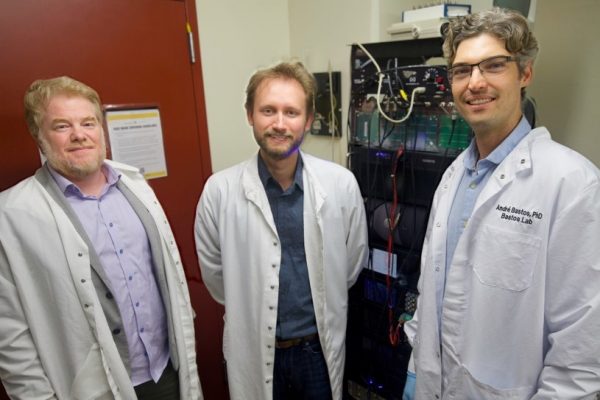A team comprising Assistant Professor of Psychology André Bastos, Associate Professor of Psychology and Associate Professor of Ophthalmology and Visual Sciences Alexander Maier and Ph.D. candidate Jacob A. Westerberg is among three international research teams that have won the opportunity to pursue their exploration of brain function at the Allen Brain Observatory.
Bastos, Maier and Westerberg’s project will explore theories around predictive coding, or brain energy conservation. Predictive coding allows the brain to conserve energy when an environment meets the brain’s expectations so that it can instead focus on the rewarding or dangerous results of unexpected scenarios. The team is exploring predictive coding by measuring neural activity with neuropixel probes that can record thousands of neurons simultaneously. The team will measure the activity in brain areas exposed to expected or unexpected images to see exactly which neurons conserve their energy. In addition, a technique called optogenetics will define the specific type of inhibitory neurons that are activated during processing of expected images.
“The idea behind predictive coding is that the brain actively subtracts away the part of the neuronal response that is fully expected,” said Bastos, who has a longstanding interest in the neuronal circuits that implement prediction. “This allows us to devote resources to unexpected inputs. We hypothesize that this ‘active subtraction’ is achieved by selective activation of inhibitory interneurons. This collaboration with the Allen Institute is providing us with the cutting-edge tools to finally address this question.”

“To me, this model seems to be the future. The data collection side can really only be done by the Allen Institute,” Maier said in a release. “To open up this resource to investigators like us who do not have that available, and then to split the work in terms of who collects the data and who analyzes the data, that to me seems like a quantum leap.”
The observatory is facilitated by the Allen Institute’s OpenScope initiative. Similar to the way astronomers from around the world convene at just a few observatories housing sophisticated and costly equipment to study the universe, the Allen Brain Observatory allows neuroscientists to propose and direct theoretical, computational and experimental science conducted on one of the institute’s high-throughput experimental platforms. All research produced at the observatory is made freely available to anyone tackling open questions in neural activity in health and disease.
“In the era of big neuroscience data, techniques to gather that data are becoming more sophisticated—and more complicated and expensive. A community platform like OpenScope can help democratize some aspects of this kind of science, giving access to researchers who might not have the funds or time to conduct such large-scale experiments in-house,” said Jérôme Lecoq, associate investigator at the Allen Institute and head of the OpenScope program, which is part of the institute’s MindScope program.
The other two teams selected are led by researchers from the University of California, Berkeley and York and McGill Universities in Canada. These teams are researching what illusions can teach us about the brain and how neurons integrate unexpected signals.
About MindScope
The MindScope program at the Allen Institute, which includes OpenScope, seeks to understand the transformations, sometimes called computations, in coding and decoding that lead from photons to behavior and conscious experience by observing, perturbing and modeling the physical transformations of signals in the cortical-thalamic visual system within a few perception-action cycles. The program generates data and discoveries through the Allen Brain Observatory, a standardized and high-throughput experimental platform that captures neurons and circuits in action in the visual regions of the mouse brain, to glean principles of how the mammalian brain processes information, responds to the external world and drives behavior.
About the Allen Institute
The Allen Institute is dedicated to answering some of the biggest questions in bioscience and accelerating research worldwide. The institute is a recognized leader in large-scale research with a commitment to an open science model. Its research institutes and programs include the Allen Institute for Brain Science, launched in 2003, the Allen Institute for Cell Science, launched in 2014, the Paul G. Allen Frontiers Group, launched in 2016, the Allen Institute for Immunology, launched in 2018, the MindScope Program, launched in 2020 and the Allen Institute for Neural Dynamics, launched in 2021.
